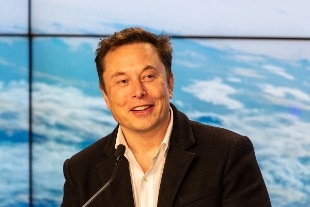- Musk, Bezos Gates and Obama's Twitter accounts hacked
- On May 27, the first human flight from the United States after the withdrawal of the Shuttle. Thanks to Elon Musk
- Brain-computer dialogue, a possible challenge. Word of Zuckerberg and Musk
Share
August 30, 2020Entering the human brain through technology. It is the new challenge of the American visionary Elon Musk who presented the results achieved with his Neuralink, a company specialized in artificial intelligence.The project he is working on aims to connect the brain directly to a machine, a
device, with enormous potential developments starting in the health field. A sort of 'chip' capable of creating a "symbiosis with artificial intelligence".
Objective of the operation: to restore speech and mobility to paralyzed people. Neuralink, one of the many startups of the founder of Tesla and SpaceX, is testing it on Gertrude, a pig. Waiting to be able to approve it for humans. "It's like a Fitbit (a smartwatch) in your head," Elon Musk enthusiastically explained, during an online conference on the progress of his brain-computer interface project, which is receiving much attention, but also skepticism, from the scientific community. .
The futuristic entrepreneur presented a chip with ultra-fine threads a year ago, which can be implanted in the brain by a robot: a sort of ultra-precise sewing machine. The new model, wireless thanks to bluetooth technology, recharges at night and measures 23 mm in diameter (like a small coin) by 8 mm thick. In theory, the round chip will be implanted in the brain, without having to spend a night in the hospital, and without leaving any trace, except for a small scar under the hair.
It will primarily be used to treat neurological diseases. But the long-term goal is to make implants so safe, reliable, and simple that they qualify for elective surgery. People could then spend a few thousand dollars to equip their brains with computing power. For the time being, in the Neuralink labs, the pig Gertrude walks on a treadmill, with her snout in a manger hanging in front of her, while the chip retransmits her neurological signals.
From this information, the computer isable to predict at any time where each of its members is. This gives hope to restore the mobility of paraplegic people. In the event of a spinal cord injury, another chip could be implanted at the injury site and bypassed the damaged "transmission circuits," imagines Elon Musk. "In the long run, I am sure we will be able to resume full use of our body."
Musk's is obviously not a solo race. Many companies are working on computer thought control and more brain-machine interfaces are being developed. Facebook is also funding a project to translate brain activity into words, using algorithms, to give voice to people who are mute due to neurodegenerative diseases. Many scientists point out, however, that the brain is not as compartmentalized as one would like to think.
"Each brain has a unique and massively interconnected structure," Cardiff University researcher Dean Burnett commented before the conference, saying he is skeptical of Neuralink's true findings. Musk's goal with this YouTube presentation was primarily to attract and recruit many engineers, surgeons, chemists, robotics specialists and others. The start-up has only a hundred employees, but hopes to reach 10 thousand as soon as possible, to face a mountain of challenges.The computer chip must be protected from external disturbances (interference on waves, signal strength) but also internal.
His communications with the smartphone and any other machine must be inviolable. And of course, as with Tesla's self-driving cars, behind the boss's ambitious announcements, the chip is based on the green light of regulators. The billionaire announced that Neuralink had just gotten approval from US health authorities for the tests, without specifying a horizon for the first human implants. In July 2019, he had promised them for 2020.
But nothing cools the ardor of the billionaire, who wants to colonize Mars and fears that artificial intelligence technologies will turn humans into computer "domestic cats". His team dreams, among other things, of ending extreme pain, healing depression and addictions or unraveling the mysteries of consciousness. From science to science fiction with him the step is short.
"You will be able to save your memories and even potentially download them to another body or a robot," "The future will be strange," Musk said.

